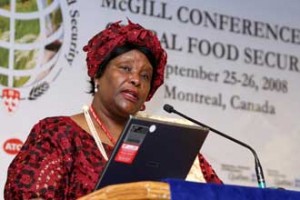
By McGill Reporter Staff
They came from all over the world to talk about food, from countries where sustenance is bountiful to developing nations where the luckiest among the poor scratch and scrape to afford a handful of rice. The unlucky ones don’t eat at all.
Inspired by the devastating spike in food prices that triggered rioting around the world earlier this year, McGill University hosted some 360 participants from 17 countries at the International Conference on Global Food Security from Sept. 24-26. During the three-day event leading international experts in agriculture, food and nutrition, policy and development discussed a framework for long-term solutions to declining world food stocks and rising food prices.
Kanyo Nwanze, Vice-President of the International Fund for Agricultural Development, immediately set the tone for the conference in a keynote address when he implored audience members to take action.
“According to the International Convention on Economic and Social Rights, every human being has the right to adequate food and the fundamental right to be free from hunger. Realization of the right to food requires that every man, women and child has a right to access at all times adequate food or means for its procurement in a dignified way. Adequate food means food which is of sufficient quantity and quality to satisfy the dietary needs of individuals, free from adverse substances and acceptable within a given culture. We have a moral obligation to act now.”
Over the course of the next three days, the world’s food supply and the systems that deliver it were analyzed, historicized and, in some cases, demonized. Heart-wrenching first-person accounts of the horrible impact food shortages have on entire generations put into chilling perspective the urgent need for far-reaching solutions.
While consensus was achieved at the very outset of the conference – that sustainable solutions must be developed to ensure such a crisis won’t happen again – many attendees politely agreed to disagree with what form those solutions must take.
Genetically modified organisms were touted by some and regarded skeptically by others. Some called for a moratorium on ethanol production as the increased demand for corn has driven prices higher. Others said the pressure put on grain markets by ethanol production was negligible. “The one conclusion we came away with from all this was there is no one-size-fits-all solution,” said Chandra Madramootoo, Dean of the Faculty of Agricultural and Environmental Sciences and a key organizer of the conference. “Each country has different food needs and different socio-economic realities. There will never be one unique solution to this crisis.”
One common theme running throughout the conference was the need for increased investment in agriculture research in a world where such funding seems to be drying up. In order to meet the voracious demands of a growing global population, new agricultural techniques and technologies must be continually developed. But, as was demonstrated by Robert Zeigler, Director General of the International Rice Research Institute (IRRI), this type of development often requires long-term investments in both time and money.
Zeigler outlined a new type of rice developed by the IRRI that can thrive in flood conditions normally fatal to rice paddies (most rice varieties will die within a week if completely submerged). With crop scientists estimating annual rice losses across south and southeast Asia due to flooding totalling some U.S. $1 billion, the new rice promises to be a boon to farmers hardest hit by cyclones. Tests run by the IRRI show the flood-resistant rice yields up to three times as much as normal varieties in severe conditions. “We have the ability to address some of the most serious constraints to food production – in this case, rice – if we can apply science and technology to them,” said Zeigler. “But it will require continual investment, not just two or three years. This project was started in 1987 and now it is going out to farmers in Bangladesh.”
In the end, the McGill conference galvanized people whose interest and expertise in global food issues was as wide as it was varied. Politicians and policy- makers sat alongside scholars and students debating, discussing and detailing a host of possible scenarios that could help ease the current situation. But now that the Conference has ended, the question becomes, what next?
For Madramootoo, the answer is clear. “This can’t be a one-off. McGill must capitalize on the interest created by the conference and take on a more permanent role in terms of policy analysis and policy debate, and in setting some of the research agendas for global food security. It is up to us to pick up the gauntlet and move forward.”
